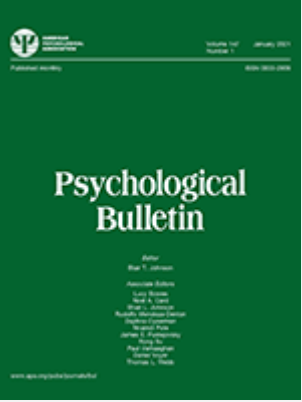关注成长心态干预文献中的偏见:对将讨论置于背景下的评论的回复(Oyserman, 2023;燕,Schuetze, 2023)并说明结论(Tipton et al., 2023)。
IF 17.3
1区 心理学
Q1 PSYCHOLOGY
引用次数: 0
摘要
本文章由计算机程序翻译,如有差异,请以英文原文为准。
A spotlight on bias in the growth mindset intervention literature: A reply to commentaries that contextualize the discussion (Oyserman, 2023; Yan & Schuetze, 2023) and illustrate the conclusion (Tipton et al., 2023).
Two meta-analyses examined the effects of growth mindset interventions. Burnette et al. (2023) tested two moderators and found that effects ranged from negative to positive. We (Macnamara & Burgoyne, 2023) tested 11 preregistered moderators and examined the evidence according to a well-de fi ned set of best practices. We found major areas of concern in the growth mindset intervention literature. For instance, 94% of growth mindsetinterventionsincludedconfounds, authorswith aknown fi nancialincentivewere twoand a half times as likely to report positive effects, and higher quality studies were less likely to demonstrate a bene fi t. Yan and Schuetze (2023) contextualized these fi ndings by describing problems with mindset theory and its measurement. Likewise, Oyserman (2023) discussed how growth mindset is a culturally fl uent idea; papers supportive of growth mindset are widely embraced, whereas papers taking a skeptical approach are challenged.Inanothercommentary, Tiptonetal.(2023)challengedourresults,claimingtoproducepositive effects byreanalyzingourdata setusingBurnetteet al. ’ s (2023)approach.However,inadditiontochanging the approach, Tipton et al. changed effect sizes, how moderators were coded, and which studies were included, often without explanation. Though we appreciate the discussion of multiple meta-analytic approaches, we contend that meta-analytic decisions should be a priori, transparently reported, and consistently applied. Tipton et al. ’ s analysis illustrated our (Macnamara & Burgoyne ’ s, 2023) conclusion: Apparent effects of growth mindset interventions on academic achievement may be attributable to inadequate study design, reporting fl aws, and bias.
求助全文
通过发布文献求助,成功后即可免费获取论文全文。
去求助
来源期刊

Psychological bulletin
医学-心理学
CiteScore
33.60
自引率
0.90%
发文量
21
期刊介绍:
Psychological Bulletin publishes syntheses of research in scientific psychology. Research syntheses seek to summarize past research by drawing overall conclusions from many separate investigations that address related or identical hypotheses.
A research synthesis typically presents the authors' assessments:
-of the state of knowledge concerning the relations of interest;
-of critical assessments of the strengths and weaknesses in past research;
-of important issues that research has left unresolved, thereby directing future research so it can yield a maximum amount of new information.
 求助内容:
求助内容: 应助结果提醒方式:
应助结果提醒方式:


